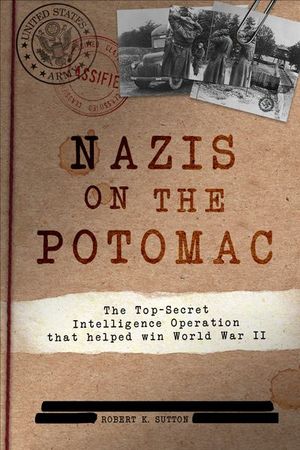Nazis on the Potomac
Published by Casemate Publishers
“A fascinating account” of the secret Virginia facility code-named PO Box 1142, where the US gathered intelligence and interrogated German prisoners (Journal of Counterterrorism & Homeland Security International).
About fifteen miles south of Washington, DC, Fort Hunt, Virginia is a green open space enjoyed by residents. But not so long ago, it was the site of one of the highest-level clandestine operations of World War II.
Shortly after the US entered the war, the military realized it had to work on exploiting any advantages it might gain on the Axis Powers. One part of this endeavor was to establish a secret facility not too close to—but also not too far from—the Pentagon, which would interrogate and eavesdrop on the highest-level Nazi prisoners and also translate and analyze captured German war documents. That complex was established at Fort Hunt, known by the code name: PO Box 1142.
The American servicemen who did the interrogating and translating were young, bright, hardworking, and absolutely dedicated to their work. Many of them were Jews who’d escaped Nazi Germany as children—some had come to America with their parents, others had escaped alone, but their experiences, and what they’d been forced to leave behind, meant they had personal motivation to do whatever they could to defeat Nazi Germany. They were perfect for the difficult and complex job at hand. They never used corporal punishment in interrogations of German soldiers but developed and deployed dozens of tricks to gain information. The Allies won the war against Hitler for a host of reasons, discussed in hundreds of volumes. This is the first book to describe the intelligence operations at PO Box 1142 and their part in that success. It will never be known how many American lives were spared, or whether the war ended sooner with the programs at Fort Hunt, but it’s doubtless that they made a difference—and gave the young Jewish men stationed there the chance to combat the evil that had befallen them and their families.
“Fills a gap in World War II intelligence history by documenting the origins of a number of European Theater intelligence successes thanks to the work of Ft. Hunt interrogators.” —Studies in Intelligence
Includes photographs
About fifteen miles south of Washington, DC, Fort Hunt, Virginia is a green open space enjoyed by residents. But not so long ago, it was the site of one of the highest-level clandestine operations of World War II.
Shortly after the US entered the war, the military realized it had to work on exploiting any advantages it might gain on the Axis Powers. One part of this endeavor was to establish a secret facility not too close to—but also not too far from—the Pentagon, which would interrogate and eavesdrop on the highest-level Nazi prisoners and also translate and analyze captured German war documents. That complex was established at Fort Hunt, known by the code name: PO Box 1142.
The American servicemen who did the interrogating and translating were young, bright, hardworking, and absolutely dedicated to their work. Many of them were Jews who’d escaped Nazi Germany as children—some had come to America with their parents, others had escaped alone, but their experiences, and what they’d been forced to leave behind, meant they had personal motivation to do whatever they could to defeat Nazi Germany. They were perfect for the difficult and complex job at hand. They never used corporal punishment in interrogations of German soldiers but developed and deployed dozens of tricks to gain information. The Allies won the war against Hitler for a host of reasons, discussed in hundreds of volumes. This is the first book to describe the intelligence operations at PO Box 1142 and their part in that success. It will never be known how many American lives were spared, or whether the war ended sooner with the programs at Fort Hunt, but it’s doubtless that they made a difference—and gave the young Jewish men stationed there the chance to combat the evil that had befallen them and their families.
“Fills a gap in World War II intelligence history by documenting the origins of a number of European Theater intelligence successes thanks to the work of Ft. Hunt interrogators.” —Studies in Intelligence
Includes photographs
BUY NOW FROM
COMMUNITY REVIEWS
